Armstrong Browning Library Offices
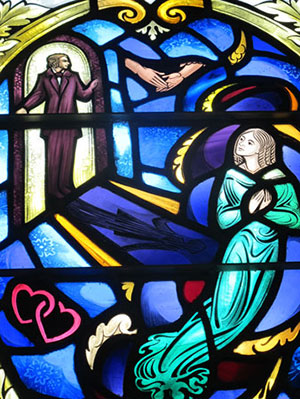
While the majority of stained glass windows in the Armstrong Browning Library are easily accessible for viewing, there are several that exist inside offices and work spaces on the third floor. These thirteen windows were created and installed over a thirty-year period (1960 - 1990) by Charles J. Connick Associates, Inc., Boston, Massachusetts; Lynn Hovey Studio, Inc., Cambridge, Massachusetts; and L. L. Sams Stained Glass, Waco, Texas. The project enhanced the working environment for the staff and successfully filled all of the windows on the third floor with beautiful stained glass.
Please use the links below to view the outstanding windows that are often unavailable to the public and to enjoy excerpts from the poetry that inspired them:
Boy and the Angel Window 1, Room 302
Charles J. Connick Associates, Boston, Massachusetts, 1981
The first window is in memory of Joseph Hugh Flood, III, grandson of Daphne and Jack Herring (Director of the Armstrong Browning Library from 1959 - 1984). The poem, "The Boy and the Angel," is about a little boy who was ardent and persevering in his praise of God. The child was so industrious and busy as he worked in a carpentry shop, and yet at the same time so sincere and so constant and persevering in his praise of God that God and certain angels took notice of him, thus the quotation on the window: "O'er his work he sang 'Praise God.'"
The angels, seeing God's preference for the boy's praise, decided to perform a miracle regarding the child. The angels arranged for the lad to become a priest and live a life of religious training; meanwhile one of the angels replaced the child in the carpentry shop so that he was never missed. Eventually the boy grew up from priest to become Pope. As Pope, he praised God in "that great way" in St. Peter's in the Vatican, seated on the papal throne. But God was displeased. He preferred the innocent and human, though flawed and imperfect voice of the sincere child to the trained, "perfect," formal praises from the Pope. The poem comes to a climax with God's declaration: "I miss my little human praise," the quotation incorporated into the second window.
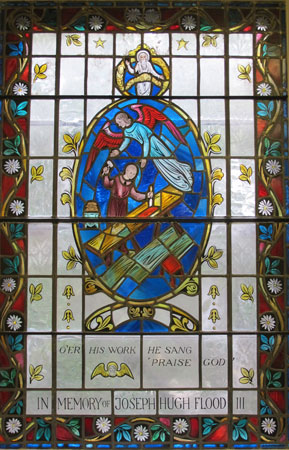
Excerpt from Robert Browning's
"The Boy and the Angel"
Morning, evening, noon and night,
"Praise God!" sang Theocrite.
Then to his poor trade he turned,
Whereby the daily meal was earned.
Hard he labored, long and well;
O'er his work the boy's curls fell.
But even, at each period,
He stopped and sang, "Praise God!"
Then back again his curls he threw,
And cheerful turned to work anew.
O'er his work he sang
'Praise God'
In memory of Joseph Hugh Flood III
Gift of Daphne and Jack Herring, Penny and Joe Flood, and Susan and Paul Herring
Boy and the Angel Window 2, Room 302
Charles J. Connick Associates, Boston, Massachusetts, 1981
Given by a long-time Baylor friend, this second window honors Daphne and Jack Herring and contains images that convey their long association with Baylor University, their hometown of Waco, and their love of travel, especially the journeys to England and Italy as they conducted literary tours. Incorporated into the main medallion of the window are London's Big Ben, Giotto's bell tower in Florence, a Baylor University spire, and an angel hovering over the dome of St. Peter's Basilica in Rome while the boy works below. Beneath the medallion are "clasped hands"--reminiscent of the bronze sculpture of the Brownings as they held hands (also a trait of the Herrings). Featured in the borders of the two windows are daisies, inspired by the name of the Waco High School yearbook, The Daisy Chain. Jack Herring and Daphne Norred were high school sweethearts and graduates of the school.
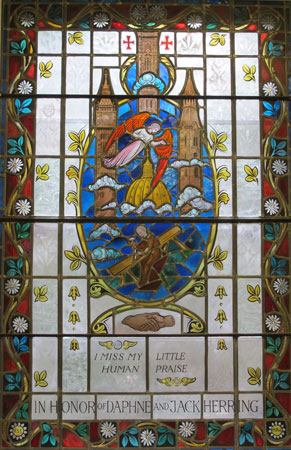
Excerpt from Robert Browning's
"The Boy and the Angel"
And ever o'er the trade he bent,
And ever lived on earth content.
(He did God's will; to him, all one
If on the earth or in the sun.)
God said, "A praise is in mine ear;
There is no doubt in it, no fear:
"So sing old worlds, and so
New worlds that from my footstool go.
"Clearer loves sound other ways:
I miss my little human praise."
I miss my little human praise
In honor of Daphne and Jack Herring
Gift of Dorothy Ann (Mrs. Frank M.) Wilson
Muleykeh Window, Room 302
Lynn Hovey Studio, Cambridge, Massachusetts, 1989
The theme established in the windows dedicated to "The Boy and the Angel" is: God needs and appreciates and enjoys the earnest, unrewarded, though imperfect, praise and service from humans--even weak humans. It is mainly and perhaps only through humans that God's work on earth is to be done. The two windows in memory of Milton Gregory (1913 - 1988) bear out this theme, recognizing him as one of those humans who was doing God's service on earth.
The first window features Hoseyn's beloved Arabian horse, Muleykeh, with her whitened forefront. Hoseyn is seated on the right and pictured with a moon on his breast. This indicates the energy Muleykeh gives him: "On his breast a moon-like piece, some orb which of night makes morn." Duhl, in rich robes, kneels before Hoseyn in a begging attitude. Duhl's son is shown emitting rays: "The oil of your lamp is your son." The wife and son recall Duhl's efforts to beg for the horse. The camels represent his efforts to buy Muleykeh. Finally, in the upper right, Duhl is shown stealing Muleykeh and riding from Hoseyn's poor nomatic tent towards the ridge of El-Saban. "A lighted lamp" shines at the top of the medallion.
When Hoseyn speaks the line quoted in the window, he is talking to his "friend" Duhl. Hoseyn continues his statement with: "The oil of your lamp [Duhl's] is your son: I shine while Muleykeh lives." A basic analogy has been established--each person's life is like a lamp. The fuel, which provides light from the lamp, is the oil. The oil is equivalent to the inspiration, the energy, the stimulation to action and to service. The light is the service, the helpfulness to others.
The poem has an ironic ending: Hoseyn would rather lose his beloved Muleykeh than have Muleykeh beaten in a race! Hoseyn gives the thief, who is stealing Muleykeh, the secret which enables the thief to escape the pursuing Hoseyn, who is riding an inferior horse. Muleykeh is the oil (inspiration) of Hoseyn's lamp (life), mainly because she is unbeaten; Hoseyn sacrifices ownership of Muleykeh in order to preserve Muleykeh as superlatively great, unbeatable.
Milton Gregory's source of energy, his inspiration, was his love of family, Baylor, Browning, Dr. Armstrong, beautiful things. He wanted Baylor and the Armstrong Browning Library to be great, often providing financial support himself or influencing others into action.
References to the over-all theme are reflected in the border with the oil cruse and the sun at the top. In the lower left corner, Robert Browning is writing verse, which was his light, and in the lower right corner, Milton Gregory is holding the Armstrong Browning Library, whose ideals inspired him (his oil) and to which in turn he offered his support (his light). The pearls at the bottom recall another name for Muleykeh, as well as being rare and precious. The roses in the border suggest love and the magnolia, love of nature and magnificence.
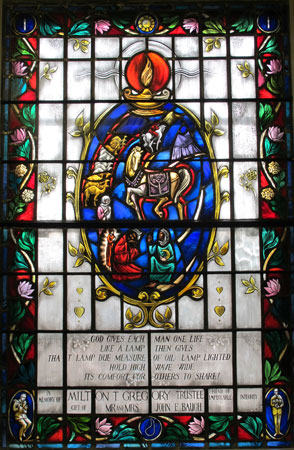
Excerpt from Robert Browning's
"Muleykeh"
'But never since time began,
Muleykeh, peerless mare, owned master
the match of you,
And you are my prize, my Pearl: I laugh at
men's land and gold!'
"God gives each man one life, like a lamp,
then gives
That lamp due measure of oil:
lamp lighted--hold high, wave wide
Its comfort for others to share!"
In memory of Milton T. Gregory, Trustee
Friend of Impeccable Integrity
Gift of Mr. and Mrs. John F. Baugh
Guardian Angel Window, Room 302
Lynn Hovey Studio, Cambridge, Massachusetts, 1989
Robert and Elizabeth visited Fano, Italy, where Browning was inspired to write "The Guardian Angel: A Picture at Fano." In the poem, Browning wishes that the Angel in the painting could step down, place the angelic hands on his throbbing head, heal his pain, and clear his vision. In this window, Robert Browning kneels in the same position as the boy in Guercino's painting, "L'Angelo Custode." The arch over his head indicates the chapel of St. Augustine's, symbolizing shelter and comfort drawn from the church. The pear tree over that indicates comfort as well. The angel bends caringly towards Browning, with "head turned away" towards the earth, drawn in the upper right. The gates of heaven are open at the top of the medallion, along with the cross potente, a traditional symbol of our Lord's power to heal diseases of people's bodies and souls. The New Zealand-like shoreline recalls that the poem is addressed to Browning's friend, Alfred Domett, in New Zealand.
The Good Shepherd in the lower corners of the border and the lamb at the top refer to the line ". . . and gently tether Me, as thy lamb there . . . ." The lily of the valley refers to the return of happiness. The lily symbolizes purity and sweetness. In Christian tradition, it is a symbol for Jesus Christ, the Lamb of God and his life on earth. The water lily at the bottom signifies purity of heart; the magnolia, love of nature and magnificence; the amarylis, pride and splendid beauty. The light flowers and red coloring of these two borders harmonize nicely with the daisy borders of the other windows in the room, depicting "The Boy and the Angel."
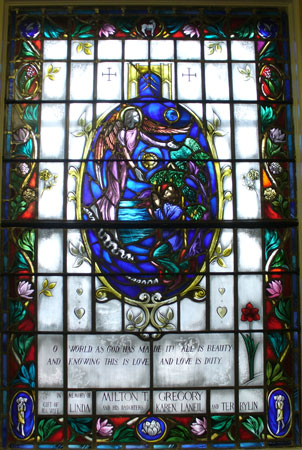
Excerpt from Robert Browning's
"The Guardian Angel: A Picture of Fano"
How soon all worldly wrong would be repaired!
I think how I should view the earth and skies
And sea, when once again my brow was bared
After thy healing, with such different eyes.
O world, as God has made it! All is beauty:
And knowing this, is love, and love is duty.
What further may be sought for or declared?
O world as God has made it! All is beauty
and knowing this is love, and love is duty
In memory of Milton T. Gregory
Gift of his wife, Linda, and his daughters, Karen, LaNeil, and Terrylin
Cleon Window, Room 304
L. L. Sams Stained Glass, Waco, Texas
Cleon, the subject of Browning's poem with the same name, is a Greek poet who represents the highest attainment of human intellect. His enlightened soul cries out in anguish for a revelation of God's willingness to live on earth as a man (Incarnation) and for a revelation of a life after death (Immortality). Browning seems to be saying that the human mind at its peak requires these two assurances (Cleon, however, turns away from the possibility offered to him in the New Testament--through Christ). Baylor University is a Christian institution founded on these two cardinal principles; Lily Russell, the Baylor Historian, exemplified the Christian life in all her work at Baylor.
The columns in this window are the primary archeological remains of Baylor at Independence, the site where Baylor University was founded in 1845. The pomegranates in the four corners of the window are reminiscent of a series of poems titled Bells and Pomegranates, for which Elizabeth Barrett first recognized Robert Browning. The yellow rose in the border represents the song "The Yellow Rose of Texas," a song President Pat Neff frequently requested to be sung at Chapel, and the trumpet creeper is a favorite of the hummingbird. These, and the red honeysuckle, are all native to Texas. The prominently featured coral yucca is especially significant because it was the subject of a study done by Dr. Cornelia Smith. Also, Dr. Smith’s maternal grandfather, John O. Meusebach, sent specimens of yucca from Texas to Dr. George Engelmann for the Missouri State Botanical Garden.
The ruby-throated hummingbird and the painting bunting were included for their beauty and colors. The scissortail and inca dove are characteristic of Texas, and the mockingbird is the Texas state bird. Immortality is symbolized by the peacock, and the stars beside it represent Texas with the Lone Star and Christianity with the Star of David.
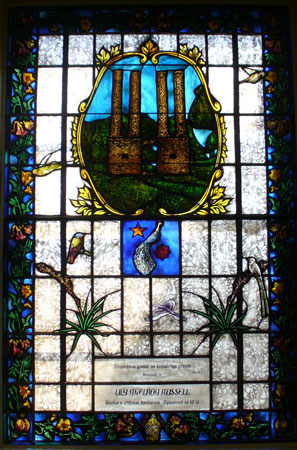
Excerpts from Robert Browning's
"Cleon"
Is this apparent, when thou turn'st to muse
Upon the scheme of earth and man in chief,
That admiration grows as knowledge grows?
In due time, let him critically learn
How he lives; and, the more he gets to know
Of his own life's adaptabilities,
The more joy-giving will his life become.
Thus man, who hath this quality, is best.
Admiration grows as knowledge grows
In tribute to Lily McElroy Russell
Baylor's Official Historian
Appointed in 1950
Gift of Cornelia Marschall Smith
Pauline Window, Room 309
Charles J. Connick Associates, Boston, Massachusetts, 1968

Excerpt from Robert Browning's
Pauline
. . . I believe in God and truth
And love; and as one just escaped from death
Would bind himself in bands of friends to feel
He lives indeed, so, I would lean on thee!
Thou must be ever with me, most in gloom
If such must come, but chiefly when I die,
For I seem, dying, as one going in the dark
To fight a giant: but live thou forever,
And be to all what thou hast been to me!
All in whom this wakes pleasant thoughts of me
Know my last state is happy, free from doubt
Or touch of fear. Love me and wish me well.
A key to a new world, the muttering
Of Angels, something yet unguessed by men.
Honoring Dr. & Mrs. Oleinick P. Constantine
Gift of Phi Beta Mu
Sonnets from the Portuguese, Sonnet 6 Window, Room 323
Charles J. Connick Associates, Boston, Massachusetts, 1974
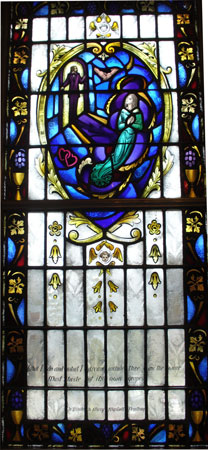
Elizabeth Barrett Browning's
Sonnets from the Portuguese
Sonnet 6
Go from me. Yet I feel that I shall stand
Henceforward in thy shadow. Nevermore
Alone upon the threshold of my door
Of individual life, I shall command
The uses of my soul, nor lift my hand
Serenely in the sunshine as before,
Without the sense of that which I forbore, ..
Thy touch upon the palm. The widest land
Doom takes to part us, leaves thy heart in mine
With pulses that beat double. What I do
And what I dream include thee, as the wine
Must taste of its own grapes. And when I sue
God for myself, He hears that name of thine,
And sees within my eyes, the tears of two.
What I do and what I dream include thee as the wine
Must taste of its own grapes
In tribute to Mary Maxwell Armstrong
Gift of Mrs. Ray Lofton Dudley
Fra Lippo Lippi Window, Room 325
Charles J. Connick Associates, Boston, Massachusetts, 1965
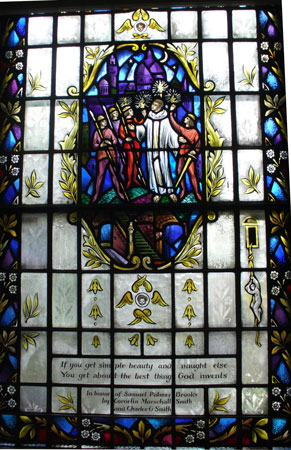
Excerpts from Robert Browning's
"Fra Lippo Lippi"
I am poor brother Lippo, by your leave!
You need not clap your torches to my face.
Zooks, what's to blame? you think you see a monk!
What, 't is past midnight, and you go the rounds,
And here you catch me at an alley's end. . . .
Into shreds it went,
Curtain and counterpane and coverlet,
All the bed-furniture--a dozen knots,
There was a ladder! Down I let myself. . . .
However, you're my man, you've seen the world
--The beauty and the wonder and the power,
The shapes of things, their colors, lights and shades,
Changes, surprises,--and God made it all!
If you get simple beauty and naught else
You get about the best thing God invents
In honor of Samuel Palmer Brooks
Gift of Cornelia Marschall Smith
and Charles G. Smith
Ferishtah's Fancies, Eagle Window, Room 320
Charles J. Connick Associates, Inc., Boston, Massachusetts, 1974
In the window devoted to the first poem, while Ferishtah has not yet attained Dervishhood, he sees an eagle feeding some young ravens, the mother bird being dead. Ferishtah interprets this to mean that God will take care of His weak creatures. But in a dream he is admonished that his part in the world is not represented by the helpless ravens but by the helpful strength of the eagle. It is his responsibility to provide saving strength for others.
The lower vignette depicts the office and desk of Charles G. Smith, a professor in the Baylor English Department from 1940 to 1967, who had a passion for books, often two rows deep on his shelves. Notice the "foot-prints" worn in the tile flooring beneath his desk. The border alternates with dogwood (the flower of Charles G.'s native state, North Carolina) and lupine (the Texas bluebonnet, where he lived), accented with open books. In addition to the primary image of the eagle and ravens, there are depictions of a robin and a cardinal.
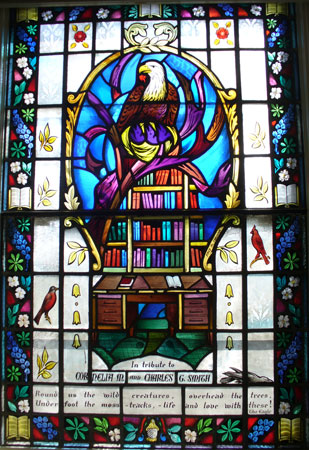
Excerpts from Robert Browning's
Ferishtah's Fancies, I. "The Eagle"
Dervish Ferishtah walked the woods one eve,
And noted on a bough a raven's nest
Whereof each youngling gaped with callow beak
Widened by want; for why? beneath the tree
Dead lay the mother-bird.
. . . sudden there swooped
An eagle downward, and behold he bore
(Great-hearted) in his talons flesh wherewith
He stayed their craving, then resought the sky.
"Ah, foolish, faithless me!" the observer smiled,
"Who toil and moil to eke out life, when, lo,
Providence cares for every hungry mouth!"
Sleep overtook the unwise one, whom in dream
God thus admonished: "Hast thou marked my deed?
Which part assigned by providence dost judge
Was meant for man's example? . . .
Sluggard, arise: work, eat, then feed who lack!"
Round us the wild creatures, overhead the trees,
Underfoot the moss-tracks, life and love with these!
In tribute to Cornelia M. and Charles G. Smith
Gift of Cornelia Marschall Smith
Ferishtah's Fancies, Melon Seller Window, Room 318
Charles J. Connick Associates, Inc., Boston, Massachusetts, 1973
In the second window, Ferishtah, not yet a full fledged Dervish, discovers a man who had for twelve years been Prime Minister, with the power and glory of the office, but who was now reduced to such woeful circumstances that he was selling melons at a bridge by the roadside. Though penniless and powerless, the beggar tells Ferishtah that his mind dwells on the years of joy rather than on the "day of woe."
The Hebrew text in the window is from the Book of Job: "Shall we receive good at the hand of God, and shall we not receive evil?"
Blue birds and orange blossoms enrich the border, and the scissor-tailed flycatcher and rock wren are represented in the center of the window. The donor's vignette symbolizes a garden statue which expresses, to some degree, the devotion between husband and wife. Note the entwined rings.
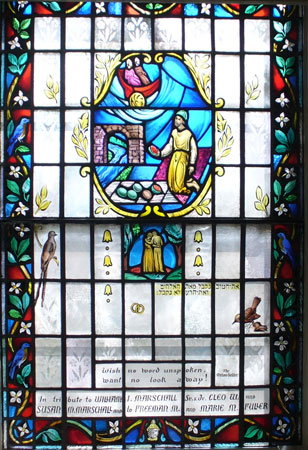
Excerpts from Robert Browning's
Ferishtah's Fancies, II. "The Melon-Seller"
Going his rounds one day in Ispahan,--
Halfway on Dervishhood, not wholly there,--
Ferishtah, as he crossed a certain bridge,
Came startled on a well-remembered face.
"Wast thou the Shah's Prime Minister, men saw
Ride on his right-hand while a trumpet blew
And Persia hailed the Favorite? Yea, twelve years
Are past, I judge . . . .
Whisper me!
Dost thou curse God for granting twelve years' bliss
Only to prove this day's the direr lot?"
Whereon the beggar raised a brow, once more
Luminous and imperial, from the rags,
"Fool, does thy folly think my foolishness
Dwells rather on the fact that God appoints
A day of woe to the unworthy one?"
Wish no word unspoken, want no look away!
In tribute to William I. Marschall, Sr. & Jr..,
Cleo W. and Susan M. Marschall, and to
Freeman M. and Marie M. Fuller
Gift of Cornelia Marschall Smith
Ferishtah's Fancies, Mihrab Shah Window, Room 316
Charles J. Connick Associates, Inc., Boston, Massachusetts, 1973
The poem titled "Mihrab Shah" examines the meaning of evil and pain. Ferishtah has reached the full status of Dervish. An inquirer is led by the bite of a scorpion to ask why God, who is all-powerful and all merciful, should allow the existence of evil and pain. Ferishtah leads his questioner to a realization of the worth of pain by a series of illustrations. In their conversation, Ferishtah discovers that the Shah receives superficial devotion from his subjects who actually detest him; but when they learn that he is tormented by an internal ulcer, their sympathy for him is manifested.
The wild rose border is related to the theme of the poem. The cultivated, sheltered rose holds up its blossoms proudly. What greater wonder that the weather-beaten wild rose "still lifts up with something of a smile its poor attempt at bloom." The personal vignette suggests the ideal conception of "Alma Mater," the concern and sympathy of friend for friend.
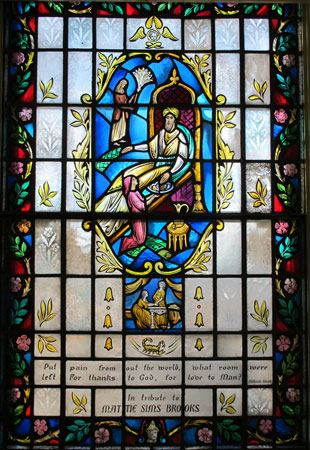
Excerpts from Robert Browning's
Ferishtah's Fancies, VI. "Mihrab Shah"
Quoth an inquirer, "Praise the Merciful!
My thumb which yesterday a scorpion nipped--
(It swelled and blackened)--lo, is sound again . . . .
But now methinks I have a mind to ask . . . .
--why needs a scorpion be?"
Said the Dervish: . . . "Come, be true! Our shah--
How stands he in thy favor? Why that shrug?
Is not he lord and ruler?
"So be it, then! He wakes no love in thee
For any one of divers attributes
Commonly deemed love-worthy. All the same,
I would he were not wasting, slow but sure,
With that internal ulcer."
Put pain from out the world, what room were left
for thanks to God, for love to man?
In tribute to
Mattie Sims Brooks
Gift of Cornelia Marschall Smith
Ferishtah's Fancies, Pillar at Sebzevar Window, Room 320
Charles J. Connick Associates, Inc., Boston, Massachusetts, 1974
The insufficiency of knowledge as contrasted with love is the central theme of "A Pillar at Sebzevar." In the search for knowledge, one not only gains an idea of the wonder of infinite knowledge, but receives ever renewed assurance that victory is yet to be reached--that is, love is victory. The "pillar" is a gnomon--the upright part of a sundial that casts the shadow. Ferishtah says men should love the creator of the instrument and the usefulness of his invention, but it is not necessary for him to know all that the inventor knew, nor to understand the motions of the sun and the subtleties of time. Consider the child who reaches for the sun but grasps an orange instead; it is enough that he experiences the pleasure which the orange provides.
The border of wild sunflowers is accented with yellow warblers, and a mockingbird and roadrunner are designed into the field of the window. The vignette recalls the donor's family love of the hill country of Texas.
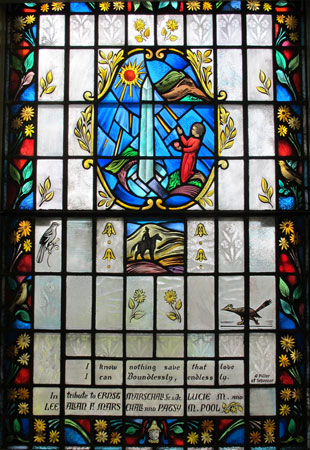
Excerpts from Robert Browning's
Ferishtah's Fancies, XI. "A Pillar at Sebzevar"
The prize is in the process: knowledge means
Ever-renewed assurance by defeat
That victory is somehow still to reach,
But love is victory, the prize itself:
Love--trust to!
By Sebzevar a certain pillar stands
So aptly that its gnomon tells the hour;
What if the townsmen said 'Before we thank
Who placed it, for his serviceable craft,
And go to dinner since its shade tells noon,
Needs must we have the craftsman's purpose clear
On half a hundred more recondite points
Than a mere summons to a vulgar meal!'
Better they say 'How opportune the help!'
I know nothing save that love I can,
boundlessly, endlessly.
In tribute to Ernse Marschall, Sr. & Jr.,
Lucie M. and Lee Allan F. Marschall,
and Patsy M. Pool
Gift of Cornelia Marschall Smith
Ferishtah's Fancies, Bean-Stripe, Also Apple Eating Window, Room 320
Charles J. Connick Associates, Inc., Boston Massachusetts, 1974
The last and longest parable in Browning's Ferishtah series deals with the question: "A good thing or a bad thing--life is which?" Ferishtah elaborately argues the point at great length with his pupil, using black and white beans to exemplify the good and bad things in life. Viewed separately, each appears black or white, but when considered as a whole, the general effect is gray. Or perhaps, in eating an apple one discovers that half of it is bad and the other half good, should one call it good or bad? One of the most striking passages occurs when Ferishtah puts aside the beans and describes the weaving of a carpet. The separate strands are not particularly pleasing to the eye. Some are garishly bright, others dull, but when all are woven together by the artist a beautiful wonder is created in color, born of both. So God mingles His own qualities with man's, good with evil, to produce the miracle of our existence.
Interspersed into the border of the morning-glory vine are a mourning dove, meadow lark, and brown thrasher. Notice the black and white beans, half-eaten apple, and above the major image a symbol of Browning's reference to a haloed moon: "moonlike through vapor." The personal vignette recalls a morning when Cornelia's sister, Irene, was discovered missing from home, only to be found--still in her bed clothes--anxiously waiting for school to begin.
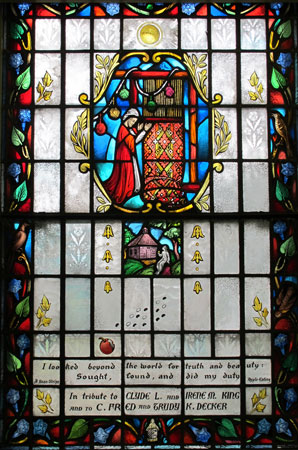
Excerpts from Robert Browning's
Ferishtah's Fancies, XII. "A Bean-Stripe, Also Apple Eating"
"Ah, the beans,--or,--example better yet,--
A carpet-web I saw once leave the loom
And lie at gorgeous length in Ispahan!
'How comes it, friend,'--
(Quoth I)--'that while, apart, this fiery hue,
That watery dimness, either shocks the eye,
So blinding bright, or else offends again,
By dulness,--yet the two, set each by each,
Somehow produce a color born of both,
A medium profitable to the sight?'"
I looked beyond the world for truth and beauty:
Sought, found, and did my duty.
In tribute to Clyde L. and Irene M. King
and to C. Fred and Trudy K. Decker
Gift of Cornelia Marschall Smith